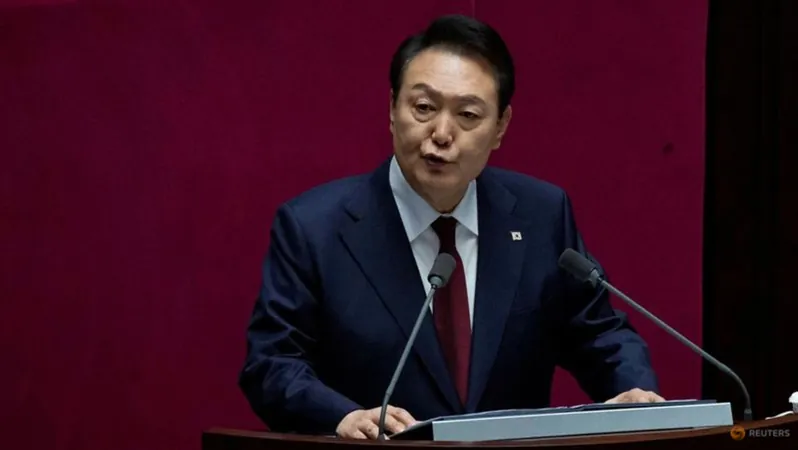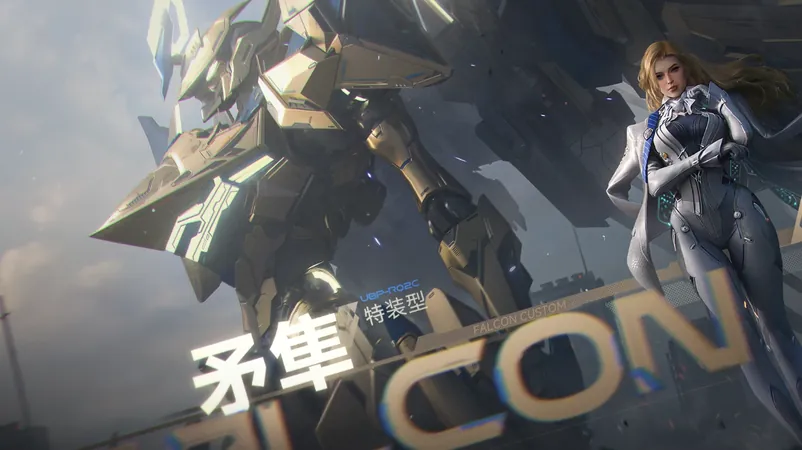
South Korean President Yoon Suk Yeol Faces Arrest After Controversial Martial Law Declaration
2025-01-02
Author: Wei
SEOUL: In a dramatic escalation of South Korea's political crisis, impeached President Yoon Suk Yeol is resisting arrest for a third consecutive day, refusing to cooperate as authorities seek to question him over his contentious martial law declaration.
This controversial statement, made on December 3, ultimately led to Yoon's impeachment, leaving him vulnerable to arrest, potential imprisonment, or even the death penalty under charges of insurrection.
Since the announcement of the martial law, which Yoon claimed was necessary to combat 'anti-state elements,' thousands of supporters and opponents alike have gathered outside his presidential residence, causing a tense standoff with police. His security detail has actively prevented police from executing the arrest warrants, igniting a heated political environment across the capital.
In a message to his supporters, Yoon expressed unwavering determination,
stating, “The Republic of Korea is currently in danger due to internal and external forces threatening its sovereignty.” He vowed to stand with his base, asserting that he was closely watching the protests via livestream and encouraging resistance against what he perceives as an assault on his leadership.
Reacting to Yoon's inflammatory rhetoric, opposition lawmakers quickly condemned his statements as reckless and divisive, with Democratic Party spokesperson Jo Seoung-lae labeling him 'delusional' and accusing him of inciting violence. Yoon's legal team is pursuing an injunction against the arrest warrant, arguing that it constitutes an unlawful action by authorities.
However, Corruption Investigation Office (CIO) chief Oh Dong-woon cautioned that individuals obstructing Yoon's arrest may themselves face prosecution.
The martial law declaration,
issued amidst escalating tensions, was swiftly rescinded within hours following nationwide protests, which showcased public disapproval of his drastic measures. In light of the political upheaval, the South Korean parliament swiftly stripped Yoon of his presidential powers, subsequently opening him up to a slew of criminal charges that could result in severe penalties.
Despite multiple summonses for questioning by prosecutors, Yoon has stubbornly deflected attempts to hold him accountable, even escalating his claims that the opposition collaborates with the country’s communist adversaries.
In response to his defiance, a surge of pro-Yoon activists have converged on Seoul to vocally support him, rallying against the police and denouncing his impeachment.
The situation has become increasingly complex as Yoon's successor, Han Duck-soo,
was also impeached for neglecting to sign bills tied to investigations of the former president. With Finance Minister Choi Sang-mok now stepping in as acting president, he has taken immediate actions to address the political instability, including appointing two new judges to the constitutional court overseeing Yoon's impeachment – a move that has drawn ire from Yoon’s allies who accuse him of overreach.
As the nation’s political landscape grows ever more tumultuous, Choi Sang-mok is now tasked with navigating through crises, including the recent tragedy of a Jeju Air plane crash that resulted in the loss of 179 lives, further complicating his administration's ability to stabilize the country amidst ongoing protests and legal battles.
As the January 6 warrant deadline approaches,
South Korea watches with bated breath to see how this dramatic saga unfolds and what implications it may hold for the future of governance in the nation.



 Brasil (PT)
Brasil (PT)
 Canada (EN)
Canada (EN)
 Chile (ES)
Chile (ES)
 Česko (CS)
Česko (CS)
 대한민국 (KO)
대한민국 (KO)
 España (ES)
España (ES)
 France (FR)
France (FR)
 Hong Kong (EN)
Hong Kong (EN)
 Italia (IT)
Italia (IT)
 日本 (JA)
日本 (JA)
 Magyarország (HU)
Magyarország (HU)
 Norge (NO)
Norge (NO)
 Polska (PL)
Polska (PL)
 Schweiz (DE)
Schweiz (DE)
 Singapore (EN)
Singapore (EN)
 Sverige (SV)
Sverige (SV)
 Suomi (FI)
Suomi (FI)
 Türkiye (TR)
Türkiye (TR)
 الإمارات العربية المتحدة (AR)
الإمارات العربية المتحدة (AR)